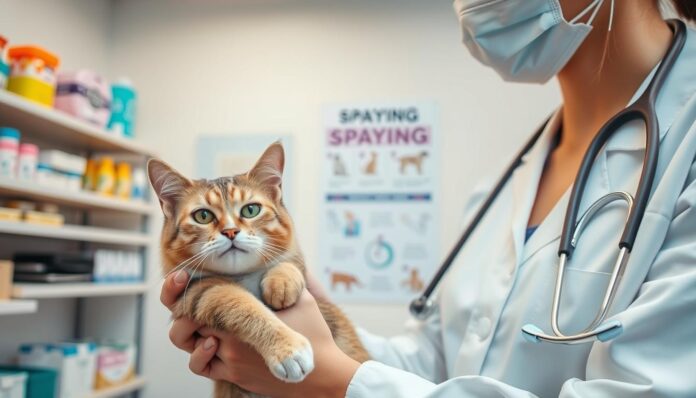As a pet owner, you want the best for your furry friend. Ensuring their health is top priority. Spaying and neutering pets offers many benefits, crucial for their well-being. The American Veterinary Medical Association (AVMA) says it can lower disease risks, enhancing their life quality.
Spaying or neutering is a proactive step for your pet’s health. It prevents unwanted breeding and roaming. This choice greatly impacts their life, making it vital to weigh the benefits when deciding.
Key Takeaways
- Spaying or neutering pets can reduce the risk of certain diseases, improving their pet health.
- The benefits of spaying and neutering pets include preventing unwanted breeding and reducing roaming behaviors.
- Spaying or neutering can help reduce the risk of certain types of cancer and infections.
- It’s essential to consider the benefits of spaying and neutering pets when making decisions about their health.
- Consulting with a veterinarian can help you make an informed decision about spaying or neutering your pet.
- By spaying or neutering your pet, you’re taking a crucial step towards ensuring their overall health and well-being.
Understanding the Benefits of Spaying and Neutering Pets
As a pet owner, you want your pet to be happy and healthy. Spaying or neutering is a key decision. It reduces bad behaviors like aggression and roaming. This keeps your pet safe and improves their life.
Research shows spaying or neutering changes pet behavior for the better. It lowers the chance of your pet fighting or running away. This makes your home and community safer for everyone.
- Reduced aggression and fighting
- Decreased roaming and escaping
- Lower risk of certain health issues
Knowing the spaying benefits helps you decide what’s best for your pet’s pet behavior. Spaying or neutering is a choice, but it’s important to think about the good it can do for your pet’s life.
Medical Benefits for Female Pets
As a pet owner, you want your female pet to live a long, healthy life. Spaying is a key way to do this. It offers many neutering benefits for her health. This can help her live longer and feel better.
Spaying can lower the risk of serious health issues. These include uterine infections and breast tumors. These problems can be deadly if not treated early. So, spaying is a smart move to keep your pet safe and happy.
- Uterine infections
- Breast tumors
- Other reproductive-related health problems
By spaying, you can lower these risks. This means your pet will have better female pet health and fewer health worries.
Spaying is a big step for your pet’s health and happiness. It offers neutering benefits and helps avoid serious health issues. Talk to your vet about when to spay your pet and any health concerns you have.
Health Advantages for Male Pets
As a responsible pet owner, you want the best for your male pet. Neutering is key to their health and happiness. It lowers the risk of testicular cancer and prostate problems, which can hurt your pet a lot.
Neutering is a common procedure that boosts your pet’s health. It has many benefits:
- Reduced risk of testicular cancer
- Lower risk of prostate issues
- Decreased risk of certain types of infections
Regular vet visits and care help spot health issues early. This ensures your male pet stays happy and healthy.
Neutering is good for your pet’s health and behavior. It strengthens your bond and makes your relationship more rewarding.
Optimal Timing for the Procedure
When thinking about spaying or neutering your pet, timing is key. It greatly affects your pet’s animal welfare and pet health. The best time varies based on your pet’s breed, size, and health.
It’s important to talk to a vet about the best timing. They can guide you based on your pet’s needs. Some breeds need spaying or neutering earlier or later for health reasons.
Here are some key factors to consider when deciding on the optimal timing for the procedure:
- Breed: Certain breeds may have specific requirements for spaying or neutering.
- Size: The size of your pet can impact the optimal timing for the procedure.
- Health status: Your pet’s overall health and any pre-existing conditions can influence the decision.
By considering these factors and consulting with a veterinarian, you can make an informed decision about the optimal timing for your pet’s spaying or neutering procedure. This will help ensure the best possible outcome for your pet’s pet health and animal welfare.
Behavioral Improvements After Surgery
As a pet owner, you want the best for your furry friend. Ensuring their pet health is top-notch is key. Spaying or neutering can greatly improve their behavior.
It reduces aggression and roaming, keeping your pet safe. This also boosts their overall well-being. A stronger bond with your pet is another benefit, as they become more relaxed and calm.
The spaying benefits are many. This procedure can also prevent some health issues. It’s crucial for maintaining your pet’s pet health.
Here are some key behavioral improvements after spaying or neutering:
- Reduced aggression towards people and other animals
- Decreased roaming behavior, which can help prevent accidents and injuries
- Less marking of territory, which can reduce unwanted spraying or soiling
Investing in your pet’s pet health through spaying or neutering is wise. It leads to a more harmonious and relaxed relationship. The spaying benefits are clear, making it a key part of responsible pet ownership.
Cost Considerations and Financial Planning
Thinking about the neutering benefits for your pet means looking at the cost. The price of spaying or neutering changes based on location, vet, and pet size. Make sure to budget for it and think about these factors to give your pet the care they deserve.
When planning for your pet’s pet care, remember the procedure’s cost. Several things can change the price:
- Location: The cost of spaying or neutering can vary depending on where you live.
- Veterinarian: Different veterinarians may charge different prices for the procedure.
- Pet size: The size of your pet can also impact the cost of the procedure.
Knowing these factors helps you make better choices for your pet’s care. Always put your pet’s health first. If you have questions, talk to your vet about pet care.
With careful planning and cost consideration, you can give your pet the best care. This ensures they live a happy and healthy life. By investing in your pet’s pet care, you’re improving their overall well-being and quality of life.
Preparing Your Pet for Surgery
When getting your pet ready for surgery, think about their animal welfare and pet health. Your vet can guide you to lower stress and anxiety. This means fasting, creating a safe space, and watching your pet’s behavior and health.
Here are some tips for a smooth experience:
- Follow your vet’s advice on fasting and medication before surgery
- Give your pet a quiet, comfy place to rest and heal
- Keep an eye on your pet’s mood and health, and tell your vet about any changes
By doing these things, you support your pet’s animal welfare and pet health. Always ask your vet about the surgery and recovery. With the right care, your pet will heal well and stay healthy for a long time.
Conclusion: Making the Right Choice for Your Pet’s Future
Spaying or neutering your pet is a big decision. It affects their health, behavior, and how long they live. Knowing the benefits of spaying and neutering helps you make a choice that’s best for them.
These benefits include less chance of health problems, better behavior, and a longer life. Always talk to a vet to find out when it’s the right time. They’ll make sure your pet gets the care they need.
Choosing to spay or neuter is a kind and responsible thing to do. It makes your pet’s life better. By doing this, you’re not just helping your pet. You’re also helping other pets in your community.
So, take this chance to give your pet a healthier and happier life. It’s a great way to show you care.
FAQ
What are the benefits of spaying and neutering pets?
Spaying or neutering your pet can greatly improve their health. It lowers the risk of certain diseases. It also changes their behavior, making them less aggressive and less likely to roam.
How does spaying benefit female pets?
Spaying female pets can prevent uterine infections and breast tumors. These can be deadly if not treated. It makes your pet healthier and can add years to their life.
What are the health advantages for male pets when neutered?
Neutering male pets can stop testicular cancer and prostate problems. These issues can be very painful and harmful. It improves your pet’s health and life quality.
When is the optimal time to spay or neuter my pet?
The best time to spay or neuter your pet varies. It depends on breed, size, and health. Always talk to a vet to find the right time for your pet.
How can spaying or neutering improve my pet’s behavior?
Spaying or neutering can make a big difference in your pet’s behavior. It reduces aggression and roaming. This keeps your pet safe and strengthens your bond.
How much does it cost to spay or neuter my pet?
The cost to spay or neuter pets changes based on location, vet, and pet size. Always budget for it. Remember, your pet’s health is the most important thing.
How should I prepare my pet for the spaying or neutering surgery?
Getting your pet ready for surgery helps reduce stress. This includes fasting and making a safe, comfy space. Watch your pet’s behavior and health closely.
What keywords should I consider adding to the FAQ?
Consider adding keywords like “pet health”, “pet safety”, and “pet longevity”. Also, think about “pet behavior modification”, “pet medical conditions”, “pet surgery recovery”, and “pet owner responsibilities”.
For more health tips and wellness advice, explore Negony.com and discover valuable insights to help you live a healthier, happier life.



























